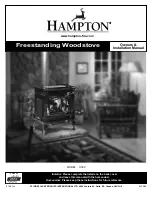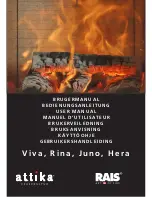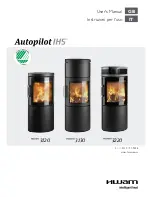
Page 15
Wood Stove - Owener's Manual -
ENGLISH
up to four hours. Small fires like this are a good time to use softer wood species and avoid
overheating the house.
3.8.2 Long Lasting Fire
For a fire that will last up to eight hours but will not produce intense heat, use soft wood and
place the logs compactly in the firebox. Before reducing the air intake, the load will have to burn
at full heat for long enough for charring the surface of the logs. The flame must be bright before
letting the fire burn by itself.
3.8.3 High Output Fires
When heating needs are high during cold weather, the fire should burn steadily and brightly. This
is the time to use larger pieces of hardwood. Place the biggest pieces at the back of the firebox
and place the rest of the pieces compactly. A densely built fire like this will produce the longest
combustion this stove is capable of.
Special attention must be paid when building fires like this since if the air intake is reduced too
quickly, the fire could smoulder. The wood must be flaming brightly before leaving the fire to
burn.
3.8.4 Burn Cycle Time
The burn cycle time is the period between loading wood on a coal bed and the consumption of
that wood back to a coal bed of the same size. The flaming phase of the fire lasts for roughly
the first half of the burn cycle and the second half is the coal bed phase during which there is
little or no flame. The burning time expected from this stove, including both phases, will vary
depending on a number of things, such as:
− firebox size,
− the amount of wood loaded,
− the species of wood,
− the wood moisture content,
− the size of the space to be heated,
− the climate zone where the house is, and
− the time of the year.
The table below gives an approximate maximum burn cycle time, based on firebox volume.
Table 1 : Approximate Maximum Burn Cycle Time
FIREBOX VOLUME
MAXIMUM BURN CYCLE TIME
<1.5 cubic feet
3 to 5 hours
1.5 c.f. to 2.0 c.f
5 to 6 hours
2.0 c.f. to 2.5 c.f.
6 to 8 hours
2.5 c.f. to 3.0 c.f.
8 to 9 hours
>3.0 c.f.
9 to 10 hours
A longer burning time is not necessarily an indication of efficient operation. It is preferable to
build a smaller fire that will provide three or four hours of heating than to fully load the firebox
for a much longer burn. Shorter burn cycles make it easier to match the heat output of the stove
to heat demand for the space.














































